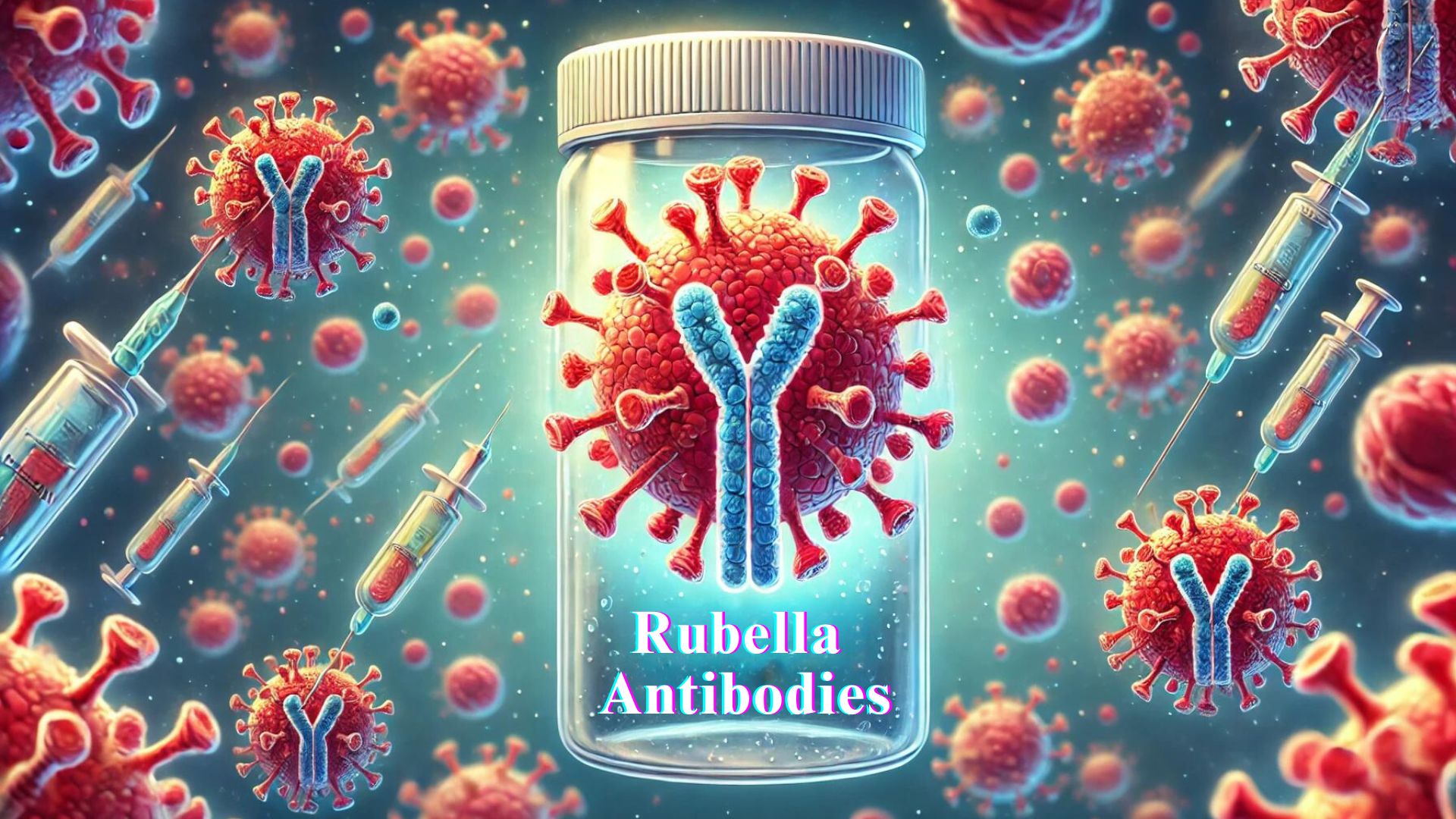Rubella and Rubella Antibodies
Overview of the Disease
Rubella also referred to as German measles is a contagious virus that is renowned for its red skin rash. The disease is typically mild for adults and children, but the significance of it is elevated due to the devastating negative effects it may cause when pregnant, resulting in Congenital rubella syndrome (CRS). CRS may cause several severe birth defects when an individual is infected while pregnant. Rubella is controlled throughout the globe through extensive vaccinations, which has highlighted the disease’s preventable characteristics.
Causes and Transmission
Rubella causes rubella virus which is a single-stranded virus in the Genus Rubivirus. Rubella is highly infectious and can be transmitted from one person to persons by droplets from the airways of people who are infected. It is spread via the sneezing or coughing process, as well as having close contact with an affected person may also aid in transmission. Rubella-infected individuals are most infectious when their eruption of the rash occurs, however, it is possible to spread the virus as early as 10 days before the appearance of the rash, and up to 2 weeks after the first rash develops.
Symptoms and Diagnosis
Rubella symptoms can be so subtle that it is possible that they will not even be observed, particularly in young children. The most common signs include a mild fever, sore throat and a rash that begins on the face and spreads throughout the body. Other signs include headaches, pink eye (conjunctivitis) as well as general discomfort before the rash develops. One of the most prominent signs of young people is the swelling glands (lymphadenopathy) which are most noticeable around the ears, and also at the rear of the neck.
The diagnosis of rubella is usually determined by tests in the laboratory, as the signs and symptoms may be similar to other viral diseases. Tests for this can consist of a rubella test to determine an antibody that could indicate an old illness or an earlier vaccine against this virus. Testing for molecular, such as PCR will determine the virus’s DNA from samples typically collected from the throat or swabs of the nose.
Understanding Rubella Antibodies

What Are Rubella Antibodies?
Rubella antibodies are proteins created through the immune system’s response to an illness caused by the rubella virus by vaccination. The antibodies are stored in our bodies and bring protection against further infections. There are two forms of rubella antibody: IgM and IgG. IgM antibodies are the first ones to show up after vaccination or an infection. They typically indicate recent or persistent illness. IgG antibodies appear later, and typically indicate earlier infections or successful vaccinations, offering long-term immune protection.
The Role of Rubella Antibodies in Immunity
Antibodies play a vital part in the ability of the immune system to combat diseases such as rubella. They recognize and bind certain antigens, like the ones on their surface on the rubella virus. They do this by blocking the virus’s replication and also preventing the virus from infecting other cells. The immune system is essential to clear the rubella virus out of the body as well as protection from the possibility of recurrence. For rubella infection, the level of IgG antibodies is often utilized as a signpost for the body’s immune system.
Types of Rubella Antibodies
The understanding of the function of these antibodies aids in diagnosing and treating rubella as well as ensuring sufficient protection against infection in the population, particularly pregnant women to avoid CRS. The most common forms of rubella antibodies that contribute to immunity and infection are:
- IgM antibody: This is the first antibody that is produced during the rubella disease. The majority of them are detectable after a couple of days of the infection. They are typically detected in blood samples for 7-10 days. The IgM antibodies are utilized to identify a recent or a recent rubella outbreak.
- IgG antibody: The antibodies show up after a while, but remain in place for life giving long-term protection against disease. They are detectable via serological testing and are typically a sign that the person is either recovering from rubella or has been vaccination-free against the disease.
The Importance of Rubella Immunization
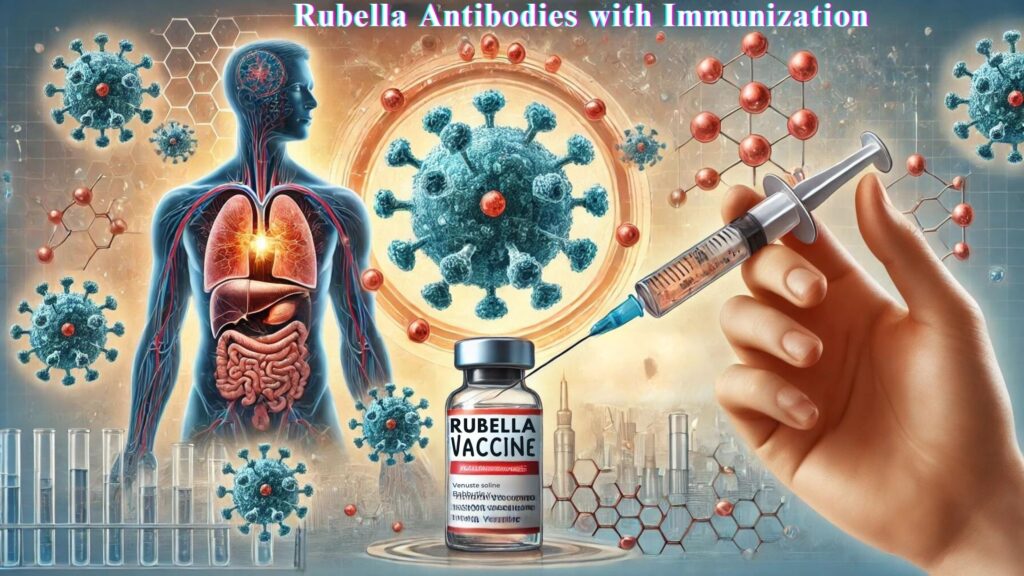
Benefits of the Rubella Vaccine
Rubella vaccination is vital due to its effectiveness in stopping rubella infections which could cause serious medical issues, especially for the unborn child. The main benefit of the rubella vaccine is the role it plays in preventing congenital rubella disorder (CRS) which is a condition which occurs in pregnant women who contract the virus and transmits it to the fetus. CRS is a serious condition that can cause birth defects like deafness, heart disease and damage to the brain. The widespread vaccination program has drastically diminished the prevalence of CRS and rubella in countries that have effective vaccination strategies, protecting not just the individual, but also entire communities against the disease.
Vaccine-Induced Antibody Production
The rubella vaccine functions by stimulating the immune system of the body to create antibodies against the rubella virus. The antibodies are retained within the body for a long time giving immunity to ensure that people are protected for the rest of their entire lives. Through mimicking the natural form of infection this vaccine can prepare the body’s immune system for fighting this virus, without subjecting those who have been vaccinated to the possibility of contracting the actual infection and its complications. The immune system’s response is essential in maintaining the community’s immunity to rubella, especially safeguarding those who have not been vaccinated or who are not able to receive the vaccine because of medical issues.
Global Vaccination Efforts and Impact
International efforts to prevent the spread of rubella have proved essential in helping to reduce the spread of the rubella virus. Organizations like the World Health Organization (WHO) as well as the Centers for Disease Control and Prevention (CDC) have been working for years to raise awareness of the rubella vaccine throughout the world, with a focus on those regions where rubella is still prevalent. The efforts not only have resulted in a drastic reduction in rubella-related cases but also brought many areas closer to eliminating rubella. Indeed the Americas have been declared to be free from an endemic rubella infection in 2015 as a testimony to the efficacy of coordinated vaccination efforts.
Rubella Antibodies and Pregnancy
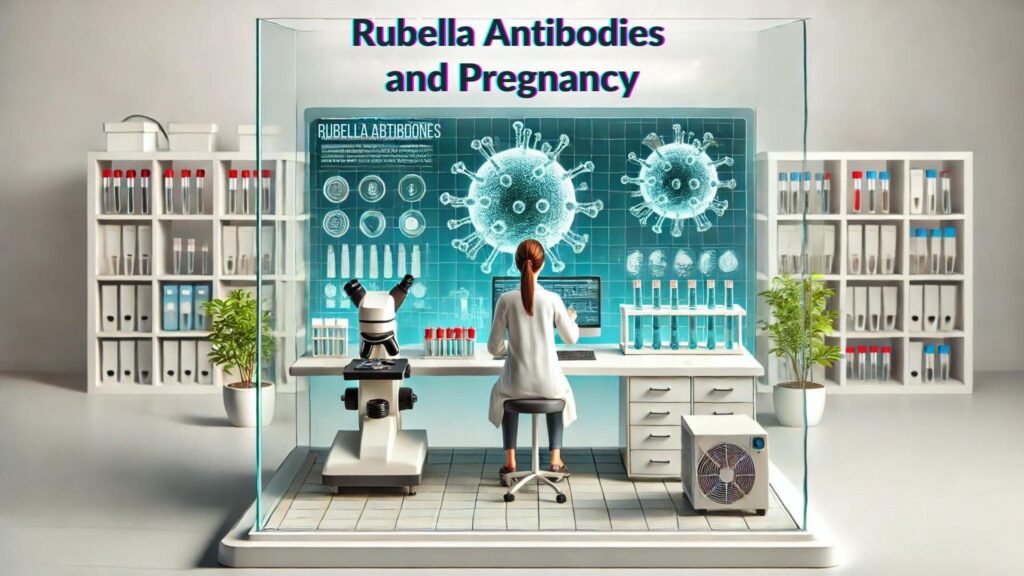
Risks of Rubella Infection During Pregnancy
Rubella illness during pregnancy is especially dangerous as it could cause congenital rubella disorder (CRS) that could have devastating consequences for the fetuses that are developing. This risk is greatest when a pregnant woman contracts rubella in the first trimester of her pregnancy when there’s up to 90% likelihood of the illness being transmitted to the foetus. What happens to the child could include a variety of serious developmental issues including the development of cataracts, hearing impairment or heart issues, as well as problems with the brain.
Testing for Rubella Antibodies in Expectant Mothers
Tests for antibodies against rubella are the standard procedure in prenatal care that can determine whether pregnant women are immune to rubella. The test, which is usually done with a blood sample examines for IgG antibodies that are specific to the rubella virus. If the test is positive, it means it is likely that the mom has already been vaccinated or suffered previously from rubella and is immune to the virus, significantly decreasing the chance of developing CRS. Women who are not immune can be given a postpartum vaccine to avoid rubella-related infections in subsequent births.
Managing Low Antibody Levels Before and During Pregnancy
In the case of women diagnosed with weak or insufficient immunity to rubella, addressing the condition before conception is essential. The women planning to get pregnant are vaccinated within a month before conception, giving them protection that reduces the chance of contracting rubella while pregnant. If a pregnant woman who is not immune gets exposed to rubella immediate measures, like the administration of hyperimmune globulin be used to ward off the risk of becoming infected by the fetus. However, this may not be effective in all cases. Unimmune pregnant women are advised to stay clear of contact with people who suffer from rubella-like or unidentified rash diseases.
Laboratory Testing for Rubella Antibodies

Types of Tests Available
The testing for antibodies to rubella is crucial for checking the level of the level of immunity in pregnant women and detecting congenital rubella syndrome. The most frequently used tests include:
- Enzyme-linked Immunosorbent Assay (ELISA) This test detects and analyzes antibodies in the blood which are specialized to the rubella virus.
- Hemagglutination inhibitor test – This more old-fashioned method evaluates the effectiveness of antibodies to stop the formation of clumps in red blood cells caused by a virus.
- Agglutination of latex is a rapid test performed in a variety of medical settings to determine rubella antibodies via visible the agglutination process by latex particles.
Every test comes with its protocols However, ELISA is the most commonly used method because of its sensitivity and specificity.
Understanding Test Results
Rubella tests for antibodies typically show outcomes that are positive or negative which indicates whether antibodies to the rubella virus exist in blood samples, which suggests the presence of immunity. Certain tests can favour the antibody count that measures the quantity of antibodies. An improvement in titers indicates greater immunity
- Positive/Immune It indicates a previous infection or a successful vaccination, indicating protection against infection.
- Negative/Non-immune: No detectable rubella antibodies, indicating susceptibility to infection.
- Uncertain: Inconclusive results and re-testing may be suggested.
Knowing the significance of this payoff is essential to make well-informed health choices, especially in the case of pregnant women.
What to Do if You Are Not Immune
If you are unimmune, specifically those who are planning to become pregnant or working within healthcare facilities it is suggested to get vaccinated. Rubella vaccination is typically administered as a combination MMR (measles Mumps, measles, as well as rubella) vaccine. This is both safe and efficient. In the aftermath of vaccination, a second test could be scheduled at 6-8 weeks to determine the immune seroconversion.
The Global Challenge of Rubella Control

Current Global Rubella Statistics
Despite the significant advancements in vaccines, the rubella virus remains a major health problem. The World Health Organization (WHO) states that although more than 150 nations have included rubella vaccinations in their immunization programs, however, the coverage of global countries remains about 69 percent. The WHO estimates that in 2019, around one in 20,000 instances of rubella congenital syndrome were reported globally due to infections in the mother in pregnancy.
Challenges in Eradicating Rubella
Eradicating rubella presents unique challenges:
- Protection from Vaccination: A sufficient global coverage (ideally more than the 80% mark) is needed to achieve the goal of herd immunity.
- Surveillance A lot of countries do not have robust surveillance mechanisms to ensure that rubella is not spread and controlled.
- Public Education: Misinformation and vaccine resistance make it difficult to boost the number of vaccinations.
Success Stories and Lessons Learned
These achievements highlight the significance of continued vaccination programs as well as a robust surveillance system and public health education to manage and possibly eliminate rubella worldwide. Success stories in rubella control offer valuable lessons:
- The Americas: In 2015 The Americas were declared to be free of an endemic form of rubella as because of the extensive vaccination strategies as well as effective public health initiatives.
- Finland: Through continuous vaccination programs in the 1970s, Finland has maintained a very high degree of immunity in its populace.
Rubella in Immunocompromised Individuals
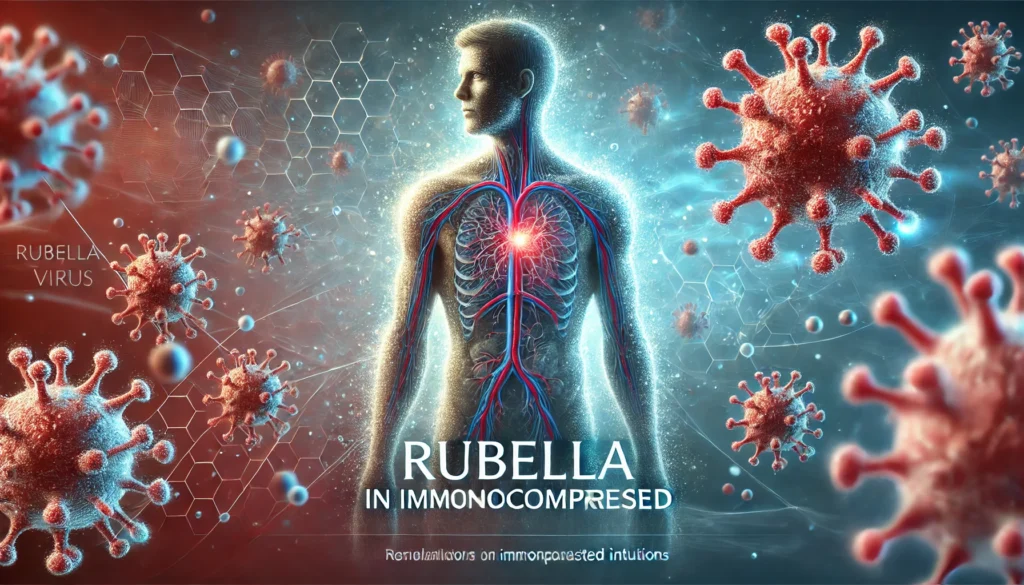
Increased Risks and Complications
Rubella generally an illness of mild severity, may be a serious risk for patients with immunodeficiency, for instance, people with weak immune systems as a result of conditions such as HIV/AIDS, chemotherapy, and organ transplants. The people with these conditions are not only more at risk of infection but are they are also more likely to suffer grave complications from rubella. This infection may last longer, and it may become more difficult to treat for these groups boosting the likelihood of severe complications and the possibility of spreading to other people.
Monitoring and Managing Rubella Antibodies
The regular monitoring of the antibodies to rubella for patients with immunocompromised immune systems is essential. It aids in determining their level of immunity and determines whether they require more shots or vaccination boosters. Health professionals can use tests to determine the amount of rubella-specific antibodies. If the titers show an absence of or low levels of the immune system, re-vaccination could be needed. Controlling rubella antibodies energetically requires coordination with specialists in infectious diseases to develop immunization plans like on the individual’s immune abilities.
Preventative Measures and Treatment Options
The perfect preventive measures to avoid rubella infection among immunocompromised people consist of vaccination before immunosuppression as much as possible, and also avoiding being exposed to rubella. When exposure risk is high, for example, hospitals that require strict practices for infection control are essential. There are only a few treatment options available because rubella is a virus therefore the most effective method is supportive treatment. If patients with immunocompromised conditions contract rubella, the treatment focus is on relieving symptoms as well as monitoring for and treating problems like pneumonia and encephalitis.
Legal and Ethical Considerations in Rubella Vaccination
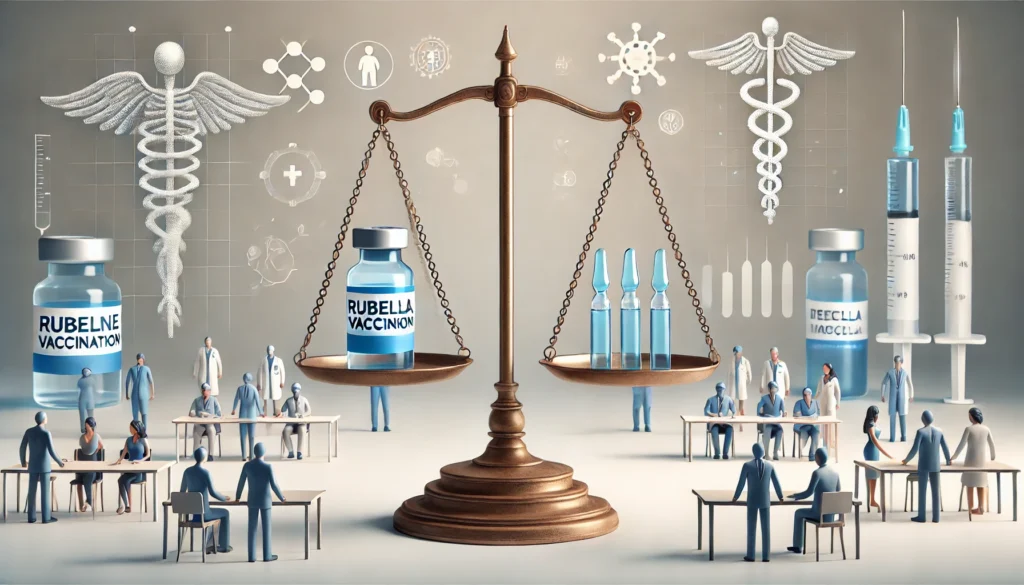
Mandates and Public Health Policies
Rubella vaccine mandates, specifically at school as they are essential strategies for maintaining high immunity levels among the population. They can also trigger moral debates over individual rights against benefits for public health. Health policies for public health must be able to balance both of these issues by making sure that vaccination mandates are backed up by evidence-based research that proves benefits are greater than risks and also by offering exemptions when medically required.
Ethical Dilemmas in Vaccination Programs
Ethical issues arise when considering the necessity of vaccination for rubella. There are issues with the rights of parents and individuals to decline vaccination, as well as the rights of the community to defend itself from preventable illnesses. Vaccination programs need to deal with these issues by encouraging an informed and informed decision-making process, and providing an open and transparent explanation of the risks and advantages of vaccination while respecting the religious, cultural, and personal convictions in promoting community health.
The Balance Between Individual Rights and Public Health
The issue in public health is finding an equilibrium between safeguarding individual rights and ensuring the health of communities. The policies should accommodate all, including accommodation and assistance for people who are not vaccinated for medical reasons and making sure that the exceptions don’t compromise herd immunity. Legal frameworks should support the policy, making sure they’re fair and legal.
Future Directions in Rubella Research
Advances in Vaccine Technology
Research into the rubella vaccine technologies can lead to better vaccines that help in providing long-lasting immunity, need lesser doses, or are simpler to administer (e.g. sprays for nasal use as opposed to injections). Research is also focusing on creating vaccines that are suitable for people with immunocompromised conditions and possibly together with innovative platforms such as mRNA vaccines.
Studies on Long-term Immunity
More research is required to comprehend the period of protection that is provided by the rubella vaccine. Long-term studies on immunity may help determine whether booster vaccinations may become necessary in the future, particularly for those who are at greater risk of being exposed or serious illness.
Potential for Rubella Antibodies
Through effective vaccination and an extremely high rate of vaccination, Rubella is a possibility to eradicate diseases globally like smallpox or the polio virus. The ongoing research is aimed at determining whether it is feasible to eradicate the disease and determine the necessary steps to complete this objective. The most important factors are maintaining an adequate vaccination rate, enhancing the global surveillance of cases of rubella as well as providing robust health systems that help in the initiatives.
Conclusion
The treatment of rubella, especially in people with immunocompromised conditions, presents specific challenges and requires careful control of the Rubella Antibodies and methods to prevent it. The ethical and legal aspects of vaccination programs highlight the necessity to ensure that individual rights are balanced with the public health requirements, which will ensure the security and active participation of the community.
In the future, advancements in the field of vaccines and continuing research on longevity-based immunity have the potential for Rubella Antibodies can be eradicated all over the world. Affordable public health programs supported by strong ethics and legal frameworks will be vital to fulfilling this goal and protecting people from this potentially fatal disease.
FAQs on rubella and Rubella Antibodies
What is Rubella Antibodies?
Rubella antibodies are proteins made through the immune system when it reacts to exposure to rubella virus either by the virus itself or through vaccination. The antibodies benefit to prevent future infections.
What is the desirable way to check for Rubella Antibodies?
The rubella virus is usually established through blood tests which test for rubella antibodies. Positive tests indicate the person has been infected before or is vaccinated and is now immune to rubella.
Can you lose Rubella Antibodies?
This is rare, but it’s possible. The majority of people who get the Rubella Antibodies will develop lasting immunity. But, in some cases, the effectiveness of the vaccine may decrease with time. Monitoring the levels of antibodies regularly will help determine whether the need for a booster shot has arisen.
What is the reason why rubella vaccination is important in pregnancies?
Rubella Antibodies are essential for pregnant women since rubella infections during pregnancy could cause severe birth defects and miscarriages. This vaccine should be administered before the due date to warrant that you are immune and avoid congenital rubella syndrome.
What’s the purpose of vaccination against Rubella Antibodies?
The main objective of vaccination against Rubella Antibodies is to stop rubella-related illnesses and, more specifically, to shield pregnant women and developing babies from the serious consequences associated with congenital rubella syndrome. With a higher level of coverage, communities are also able to move towards the elimination of rubella in the world.
